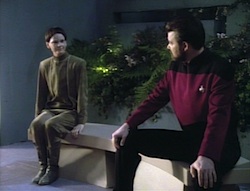Since it's Pride Month, and it just so happens "The Outcast" aired on H&I last night (on 6/26/25), can we talk about how powerful this episode was as it relates to the LGBTQ community?
Watching this episode last night, I could tell its writers wanted to do more with this episode but weren't that brave enough to do so as they were taking big enough risks with this kind of subject matter as is.
Mind you, the original run airing of this episode (and of Star Trek: The Next Generation in general for that matter) was during such a time society was a lot less tolerant and accustomed to homosexuality and transgender people than they are today. So, I think if this episode were being made today (perhaps with the newer Treks) they would've boldly gone (pardon the pun) in the direction of Soren having been born one gender and surgically becoming the other.
I mean... I don't think this is a transgender episode necessarily, but its plot does discuss societal gender roles and Soren later discovering she is female among an alien race that doesn't acknowledge gender. Not only do the J'naii not acknowledge gender in their society but any recognition of gender or feelings of romantic/intimate feelings for another person is also taboo and offensive for them that they use some kind of therapy so that the recipient no longer identifies with either gender or has romantic feelings. Similarly to how in our world some religious people used to try to "pray the gay away" or use conversion therapy to try and turn homosexuals into heterosexuals or make trans people identify with the gender they were born with.
I feel really bad for Riker in the end that his attempt to rescue Soren from her own people so she could stay the way she was failed.
Sorry for making this a long post but I like this episode and I applaud the writers and producers for tackling such a subject matter I'm sure almost no other television series at the time would've dared touched with a 10-foot pole. But then again recognition of non-binary or transgender people and/or homosexuality is the kind of thing that Star Trek stands for and I applaud that. But since this episode was so ahead of its time, does anyone remember if "The Outcast" ever caught any kind of controversy or backlash for its plot? How does it hold up today? With viewers from (or not from) the LGBT community?
Watching this episode last night, I could tell its writers wanted to do more with this episode but weren't that brave enough to do so as they were taking big enough risks with this kind of subject matter as is.
Mind you, the original run airing of this episode (and of Star Trek: The Next Generation in general for that matter) was during such a time society was a lot less tolerant and accustomed to homosexuality and transgender people than they are today. So, I think if this episode were being made today (perhaps with the newer Treks) they would've boldly gone (pardon the pun) in the direction of Soren having been born one gender and surgically becoming the other.
I mean... I don't think this is a transgender episode necessarily, but its plot does discuss societal gender roles and Soren later discovering she is female among an alien race that doesn't acknowledge gender. Not only do the J'naii not acknowledge gender in their society but any recognition of gender or feelings of romantic/intimate feelings for another person is also taboo and offensive for them that they use some kind of therapy so that the recipient no longer identifies with either gender or has romantic feelings. Similarly to how in our world some religious people used to try to "pray the gay away" or use conversion therapy to try and turn homosexuals into heterosexuals or make trans people identify with the gender they were born with.
I feel really bad for Riker in the end that his attempt to rescue Soren from her own people so she could stay the way she was failed.
Sorry for making this a long post but I like this episode and I applaud the writers and producers for tackling such a subject matter I'm sure almost no other television series at the time would've dared touched with a 10-foot pole. But then again recognition of non-binary or transgender people and/or homosexuality is the kind of thing that Star Trek stands for and I applaud that. But since this episode was so ahead of its time, does anyone remember if "The Outcast" ever caught any kind of controversy or backlash for its plot? How does it hold up today? With viewers from (or not from) the LGBT community?

